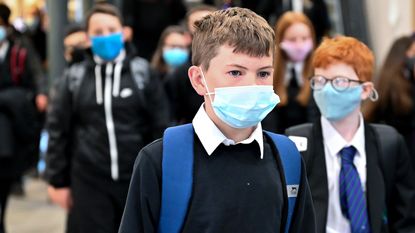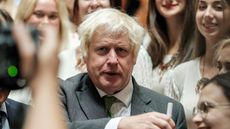Will younger children receive a Covid vaccine?
US regulators have advised Pfizer jab rollout for five to 11-year-olds

Vaccination regulators in the United States have been advised to authorise the Pfizer-BioNTech Covid-19 jab for children aged five to 11.
The decision was made by independent advisors for the US Food and Drug Administration (FDA), paving the way for the vaccine to become available to around 28 million American children.
Data indicates that the Pfizer vaccine is 90.7% effective at preventing symptomatic illness among the age group and that its benefits “clearly outweigh” the risks, The Guardian reported.
Subscribe to The Week
Escape your echo chamber. Get the facts behind the news, plus analysis from multiple perspectives.

Sign up for The Week's Free Newsletters
From our morning news briefing to a weekly Good News Newsletter, get the best of The Week delivered directly to your inbox.
From our morning news briefing to a weekly Good News Newsletter, get the best of The Week delivered directly to your inbox.
There is no vaccine currently approved for under-12s in the UK. However, Downing Street is likely to keep an eye on whether the US follows the regulators’ recommendation and makes the Pfizer jab available to children as young as five.
“This is a landmark decision that could influence practise in other countries, not just the US,” said Michelle Roberts, health editor at the BBC. “The world will be watching how the rollout goes with the Pfizer jab and what impact it has on the pandemic.”
Vaccinating teens
The decision on when to vaccinate children has been taken cautiously by the Joint Committee on Vaccination and Immunisation (JCVI) and UK government. The JCVI initially advised delaying vaccination for most young people before rolling the jab out to 16 to 18-year-olds back in August.
Sign up for Today's Best Articles in your inbox
A free daily email with the biggest news stories of the day – and the best features from TheWeek.com
The decision to make the jab available for children as young as 16 was influenced by data from the US, which found that serious side effects from the vaccine were extremely rare in 12 to 17-year-olds.
The data showed that 9.8 cases of myocarditis – an inflammation of the heart muscle – were reported per million first doses administered in males. The number rose to 67 per million after second doses, but “most people recovered quickly”.
On 2 September, the NHS reported that 50% of all teens aged 16 and 17 had received their first dose just four weeks after the green light was given for their age group.
The JCVI’s Covid-19 chair Professor Wei Shen Lim said that anyone aged 16 or over would not need their parents’ permission to get the vaccine as this is the age at which people are entitled to consent to their own medical treatments.
The plan for 12 to 15-year-olds
On 13 September, the UK’s chief medical officers recommended that one dose of the Pfizer vaccine should be made available to children aged 12 to 15.
The rollout, which is generally taking place in schools, began on 20 September, with almost three million children eligible for the jab.
Over-12s with underlying health conditions, or those who live with someone with an underlying health condition, are eligible for a second dose.
It is hoped that the extended vaccine rollout will help curb the disruption to children’s education. Modelling suggested that recommending jabs to over-12s could “save 110,000 days of missed face-to-face schooling – or one day for every 20 pupils”, reported the BBC.
What are other countries doing?
In May, Canada became the first country in the world to authorise a coronavirus vaccine for use for under-16s. The country’s health ministry approved the use of the Pfizer jab for children between 12 and 15 after Phase 3 clinical trials found that the vaccine was safe and effective in that age group.
France, Italy, Denmark, Spain and the Netherlands have all followed suit in rolling out the coronavirus vaccination to under-16s.
After initially resisting making the vaccine available to those under 16, Germany began offering jabs to all children aged 12 and over in August. Sweden also started rolling out the vaccine to all children over 12 after initially limiting it to those with an underlying health condition.
In June, China became the first country to approve a jab, the Sinovac vaccine, for children as young as three.
Israel’s health ministry said on Sunday that the country could also greenlight coronavirus vaccines for children aged five to 11 from mid-November, the Times of Israel reported. Currently, children as young as five who may be more vulnerable to the virus due to conditions such as extreme obesity, chronic lung illness or sickle cell anaemia are eligible for a vaccine.
Create an account with the same email registered to your subscription to unlock access.
Sorcha Bradley is a writer at The Week and a regular on “The Week Unwrapped” podcast. She worked at The Week magazine for a year and a half before taking up her current role with the digital team, where she mostly covers UK current affairs and politics. Before joining The Week, Sorcha worked at slow-news start-up Tortoise Media. She has also written for Sky News, The Sunday Times, the London Evening Standard and Grazia magazine, among other publications. She has a master’s in newspaper journalism from City, University of London, where she specialised in political journalism.
-
 Shardlake: a 'tightly plotted, gorgeously atmospheric piece of television'
Shardlake: a 'tightly plotted, gorgeously atmospheric piece of television'The Week Recommends Arthur Hughes captivates in this 'eminently watchable' Tudor murder mystery
By Irenie Forshaw, The Week UK Published
-
 Major League Baseball is facing an epidemic of pitcher's injuries
Major League Baseball is facing an epidemic of pitcher's injuriesUnder the Radar Many insiders are blaming the pitch clock for the rise in injuries — but the league is not so sure
By Justin Klawans, The Week US Published
-
 8 movie musicals that prove the screen can share the stage
8 movie musicals that prove the screen can share the stageThe Week Recommends The singing and dancing, bigger than life itself
By Scott Hocker, The Week US Published
-
 Covid four years on: have we got over the pandemic?
Covid four years on: have we got over the pandemic?Today's Big Question Brits suffering from both lockdown nostalgia and collective trauma that refuses to go away
By Chas Newkey-Burden, The Week UK Published
-
 The hollow classroom
The hollow classroomOpinion Remote school let kids down. It will take much more than extra tutoring for kids to recover.
By Mark Gimein Published
-
 Excess screen time is making children only see what is in front of them
Excess screen time is making children only see what is in front of themUnder the radar The future is looking blurry. And very nearsighted.
By Devika Rao, The Week US Published
-
 Covid-19: what to know about UK's new Juno and Pirola variants
Covid-19: what to know about UK's new Juno and Pirola variantsin depth Rapidly spreading new JN.1 strain is 'yet another reminder that the pandemic is far from over'
By Arion McNicoll, The Week UK Published
-
 Long-term respiratory illness is here to stay
Long-term respiratory illness is here to stayThe Explainer Covid is not the only disease with a long version
By Devika Rao, The Week US Published
-
 Covid inquiry: the most important questions for Boris Johnson
Covid inquiry: the most important questions for Boris JohnsonTalking Point Former PM has faced weeks of heavy criticism from former colleagues at the public hearing
By The Week Staff Published
-
 China's pneumonia cases: should we be worried?
China's pneumonia cases: should we be worried?The Explainer Experts warn against pushing 'pandemic panic button' following outbreak of respiratory illness
By Keumars Afifi-Sabet, The Week UK Published
-
 Vallance diaries: Boris Johnson 'bamboozled' by Covid science
Vallance diaries: Boris Johnson 'bamboozled' by Covid scienceSpeed Read Then PM struggled to get his head around key terms and stats, chief scientific advisor claims
By The Week UK Published